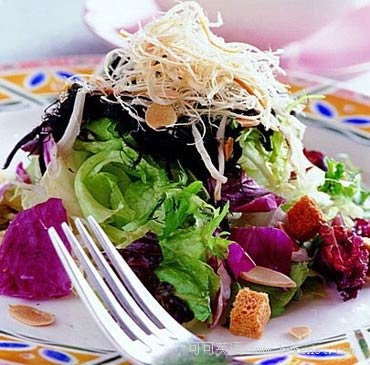
For years the advice has been clear: eating five portions a day of fruit and vegetables is the key to a healthy life. But five may no longer be enough.
在我們?nèi)粘5娘嬍持校卟伺c水果需占攝取食物總量的5成,這也是維持健康的身體與生活狀態(tài)的關(guān)鍵之一。不過現(xiàn)在看來,50%的蔬果已經(jīng)不足以滿足需求了。
A study has found that to get maximum defence against heart disease, you need to eat at least eight daily servings of fresh food.
據(jù)一份最新的健康研究顯示,為了能更好的預(yù)防心血管方面的疾病,我們每天所要食用的蔬菜與水果至少要占到飲食總量的8成。
The Government’s five-a-day advice has its roots in World Health Organisation guidelines to include 14oz of vegetables in a daily diet.
更具世界健康衛(wèi)生組織所倡導(dǎo)的“每餐需含有14盎司蔬菜的標(biāo)準(zhǔn)”,英國政府向國民建議,每日攝取的食物中最還有一般為蔬果類。
But there have been doubts over whether eating more than this level of fruit and veg meant even greater health benefits. Now the new study suggests every extra portion provides added protection.
不過有人也對(duì)此提出了懷疑,多下更多吃蔬菜與水果就是否一定以為著又會(huì)更健康的身體。而現(xiàn)在,這份研究證明,提高健康食物所占的體重將對(duì)人體提供多大的保護(hù)。
Significantly, those in the highest category – eating eight or more a day – have a 22 per cent lower chance of dying from heart disease than those who consume three portions, the UK average.
更要中的是,從英國國民健康水平的平均值來看,每日攝入近8成的蔬果的人要比那些僅僅吃“3份”蔬果的人罹患心臟病的概率小22%。











